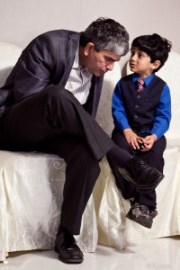This article first appeared on the blog for Baltimore Therapy Center.
There is a difference of opinions out there as to whether it is important to use the proper names for private parts when teaching children about their bodies and discussing sexual abuse issues (i.e., not the latest news story but what they need to know to prevent it). I stand heavily on the side of “YES” and I’ll give you a couple of reasons why that is, starting from the least significant (which is still pretty significant):
(Note: I am actually deliberately not writing down the names of those parts in this post so as not to get blocked by anyone’s filter. This post is for everyone!)
- It is important in order to be able to communicate a problem to someone else. If your child is at school or camp and has to tell someone that his/her pookie hurts, that does not give an awful lot of information. You might think that, well, s/he could just point or something right? Well, here is a true story (details changed): Sally went up to her teacher one day and said, “Mrs. Smith? Jonny touched my diamonds.” Mrs. Smith, busy with some paperwork, responded, “Well, tell him not to do it again,” and brushed her off. Had Mrs. Smith understood what Sally actually said, the reaction (one would hope) would have been very different.
- Your children will eventually hear the actual names for their parts, probably much earlier than you would like to think. And when they do, if it’s not from you, they will think that you don’t know those names (if they’re younger), or that you don’t want to talk about them (which is true). So they won’t talk to you about them. This is bad.
- They will learn that accurate information comes from their friends/TV/the internet/etc. – not their parents. This is also bad.
- The message you send if you never use these terms is that “there are some things we don’t talk about with mom and dad.” That is the worst possible message you can give your kids as regards keeping them safe from sexual abuse (and it’s not terribly healthy for any other issues either). You cannot protect your children from the possibility of meeting up with an abuser at some point in their life. But you can set yourself up as a resource to turn to if it ever does happen. Children who tell someone soon after an incident of abuse and who receive a loving and supportive response often do very well in terms of the impact the abuse has on them. Children who feel they cannot tell anyone are much, much worse off. it is critically important that your kids know they can talk to you about anything. This is really the underlying foundation of all sexual abuse education with your kids.
 For all these reasons, I think it is absolutely necessary to use the proper names for private parts. Now, don’t misunderstand me – you can certainly use nicknames and cute euphemisms sometimes, and even most of the time. But you must also use the correct names at times to show that you know them, use them, and are not uncomfortable about them. (Becoming not uncomfortable about them is a matter for another post.) These times would include when you first introduce them to the concept, when they ask a question about their parts, when you are having a serious discussion about them, and so forth.
For all these reasons, I think it is absolutely necessary to use the proper names for private parts. Now, don’t misunderstand me – you can certainly use nicknames and cute euphemisms sometimes, and even most of the time. But you must also use the correct names at times to show that you know them, use them, and are not uncomfortable about them. (Becoming not uncomfortable about them is a matter for another post.) These times would include when you first introduce them to the concept, when they ask a question about their parts, when you are having a serious discussion about them, and so forth.
Regarding the concern some parents have about their kids shouting out the P- or V-word in the middle of a restaurant – don’t let that sway you. Your children’s long-term safety is probably more important than your embarrassment (right?). Being embarrassed by your children is a rite of passage for parents. It happens to everyone. And the truth is, this won’t happen any more frequently than any other embarrassing thing that happens to all of us parents: in the same way that you convey to Junior that poop is not something we talk about at the dinner table, you can convey to him that these words are to be used in private settings (except in case of emergency). Kids will get it much quicker than you might think. You may have one or two incidents along the way, but that’s pretty much the same thing with poop and Aunt Gertrude’s mustache that nobody is really supposed to mention.
The words of this author reflect his/her own opinions and do not necessarily represent the official position of the Orthodox Union.

